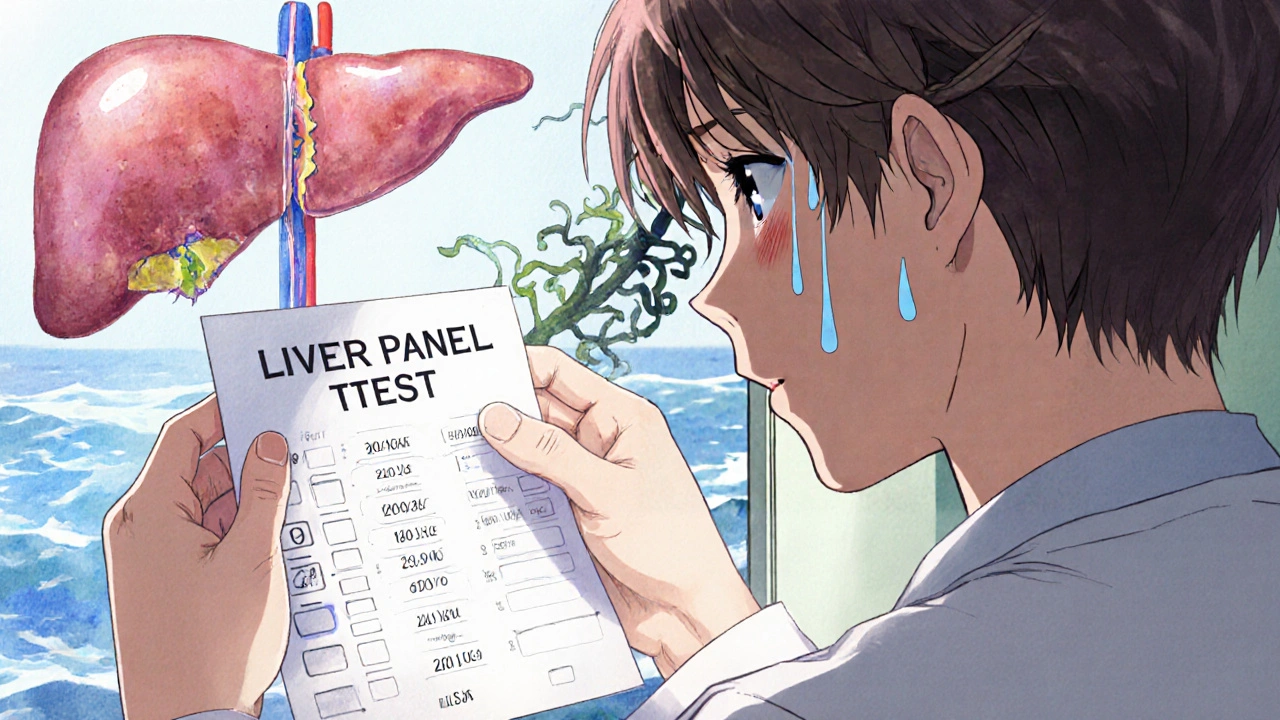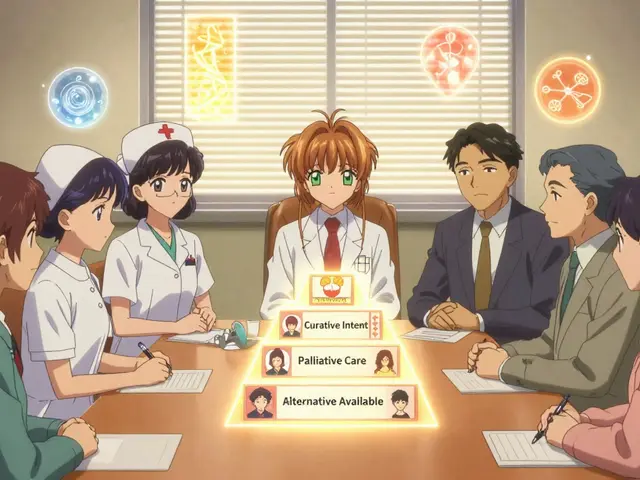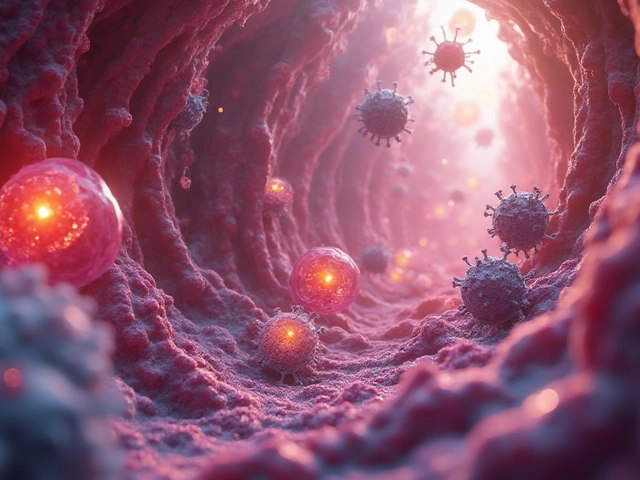Many people turn to kava as a natural way to ease anxiety, stress, or trouble sleeping. It’s been used for centuries in Pacific Island cultures, where it’s brewed as a calming drink during ceremonies. But if you’re taking any prescription or over-the-counter meds, kava could be far more dangerous than you think. The real risk isn’t just kava itself-it’s what happens when it mixes with other drugs you’re already taking.
Why Kava Can Hurt Your Liver
Kava’s active ingredients, called kavalactones, work on the brain to create a relaxed feeling. That’s why some people say it works like a mild anti-anxiety pill without the addiction risk. But here’s the catch: those same compounds also interfere with how your liver processes chemicals. Specifically, kava blocks key liver enzymes-CYP3A4, CYP2C9, and CYP2C19-that break down about 80% of all prescription drugs. When those enzymes slow down, other medications build up in your system, increasing side effects or toxicity. Worse, kava also drains your liver’s main antioxidant, glutathione. Without enough glutathione, your liver can’t protect itself from damage. Even if you feel fine, this silent process can lead to serious injury over time. In some cases, people developed liver failure within weeks of starting kava.Not All Kava Is the Same
There’s a big difference between the kava used in Fiji and the kind sold in U.S. supplement stores. Traditional Pacific Island preparations use cold water to extract kavalactones from peeled root. This method has been used safely for thousands of years with almost no liver reports. But most commercial kava products in North America and Europe use solvents like ethanol or acetone to pull out more kavalactones faster. These organic extracts contain harmful byproducts-like flavokawains-that aren’t present in water-based brews. Studies show these extracts are linked to over 90% of reported liver injuries. The FDA and WHO both warn that solvent-based kava carries a much higher risk than traditional preparations. If you’re considering kava, check the label. Look for products labeled “water-extracted” or “noble kava root.” Avoid anything that says “full-spectrum,” “ethanolic extract,” or “standardized to 70% kavalactones.” Those are red flags.Medications That Can Turn Kava Deadly
Kava doesn’t just sit quietly in your system. It interacts with many common drugs, often with life-threatening results. Here are the biggest dangers:- Alcohol: Mixing kava and alcohol doubles the risk of liver damage. Both stress the same detox pathways. One case study showed a patient developing liver failure after combining daily kava with weekend drinking.
- Acetaminophen (Tylenol): Even at normal doses, acetaminophen can become toxic when kava is added. The liver can’t handle both.
- Benzodiazepines (like Xanax, Valium): Kava enhances their sedative effects, raising the risk of overdose, dizziness, or respiratory depression.
- Antidepressants (SSRIs, SNRIs): These are metabolized by the same liver enzymes kava blocks. This can cause serotonin syndrome or worsen liver injury.
- Birth control pills (containing ethinyl estradiol): A documented case showed a woman on hormonal contraception developed acute liver failure after taking kava for two months.
- Statins (like Lipitor): These cholesterol drugs are processed by CYP3A4. Kava can cause them to accumulate, leading to muscle damage or liver stress.
- Antibiotics (like erythromycin, clarithromycin): These also rely on CYP3A4. Combined with kava, they can trigger liver toxicity.

Real Cases, Real Consequences
In 2002, the CDC reported 11 people who needed liver transplants after using kava. One patient, a 45-year-old woman, took kava (240 mg daily) along with birth control pills, migraine meds, and Tylenol. Within 17 weeks, her liver enzymes spiked from normal to over 2,400 U/L (normal is under 17). She went into comatose liver failure and survived only because she got a transplant. Another case from Sacramento County tracked 16 patients over 37 years. Six needed transplants. Thirteen were hospitalized. None knew kava could hurt their liver. Most didn’t tell their doctors they were taking it. Reddit threads from 2022 show people still posting: “My ALT jumped to 300 after I started kava tea with my blood pressure pill.” One user said, “My doctor said if I’d waited another week, I might not have made it.”Who Should Never Take Kava
If any of these apply to you, skip kava entirely:- You take any prescription medication (even if you think it’s unrelated to the liver)
- You have a history of liver disease, fatty liver, or hepatitis
- You drink alcohol regularly
- You’re over 55 or have genetic variations in liver enzymes (which are common but rarely tested)
- You’ve ever had unexplained nausea, dark urine, yellow eyes, or fatigue after taking supplements

What to Do If You’re Already Taking Kava
If you’re currently using kava and taking any meds, don’t panic-but don’t ignore it either.- Stop taking kava immediately.
- Ask your doctor for a liver panel: ALT, AST, bilirubin, and GGT. Normal results don’t guarantee safety, but abnormal ones mean you need urgent care.
- Bring your kava bottle to your appointment. Many doctors don’t ask about supplements unless you mention them.
- If you feel nauseous, tired, or notice yellowing in your skin or eyes, go to the ER. Liver damage can progress fast.
Alternatives to Kava for Anxiety
If you’re using kava for anxiety, there are safer options:- Valerian root: Studies show it helps with sleep and mild anxiety without liver risk. Use water-based extracts only.
- L-theanine: An amino acid in green tea that promotes calm without sedation. Safe with most medications.
- Magnesium glycinate: Helps regulate stress hormones. Many people are deficient.
- Cognitive behavioral therapy (CBT): Proven to reduce anxiety long-term, with no side effects.
The Bigger Picture
The global kava market is worth over $1 billion. Sales in the U.S. rose 18% in 2021 alone. But the supplement industry isn’t required to prove safety before selling. Kava is sold as a “dietary supplement,” which means it escapes FDA approval for safety or effectiveness. Meanwhile, countries like Canada, Australia, and most of Europe have banned or restricted kava. The FDA has issued multiple warnings since 2002. Yet it’s still easy to buy online or in health stores. The truth is simple: kava isn’t worth the risk if you’re on any medication. Even if you feel fine now, the damage can build silently. By the time symptoms show up, it might be too late.Can I take kava if I’m not on any medications?
Even if you’re not on medications, kava still carries liver risks. Cases of liver damage have occurred in healthy people who took kava for months. The safest approach is to avoid it entirely. If you choose to use it, stick to water-extracted noble kava, use the lowest possible dose, and limit use to less than four weeks. Never use it daily. Monitor for fatigue, nausea, or yellowing skin. Get liver tests before and after use.
Is kava tea safer than capsules or tinctures?
Yes-if it’s made from traditional water extraction using peeled root. Most commercial teas are still processed with solvents. Check the label: if it doesn’t say “water-extracted” or “noble kava root,” assume it’s risky. Capsules and tinctures are almost always made with ethanol or acetone, making them far more dangerous than traditional brews.
How long does kava stay in your system?
Kavalactones can linger in your liver for days or even weeks after stopping use. This means interactions can still happen even if you took kava a week ago. If you’re planning surgery or starting a new medication, stop kava at least two weeks ahead. Always tell your doctor about past kava use-even if it was months ago.
Why do some people say kava is safe?
People who say kava is safe often mean they used it without other drugs and didn’t have side effects. But that doesn’t mean it’s safe for everyone. Liver damage from kava is unpredictable. It can happen to healthy people with no warning. Studies show that even among users who feel fine, liver enzymes often rise above normal levels. The absence of symptoms doesn’t mean absence of damage.
Can I take kava occasionally, like once a month?
There’s no proven safe frequency. Even occasional use has led to liver failure in rare cases. The risk isn’t just about how often you take it-it’s about how your body reacts. If you have a genetic variation in liver enzymes (which affects about 1 in 5 people), even one dose could be dangerous. The safest answer is no. If you want to manage stress, try proven alternatives like exercise, meditation, or therapy.








12 Comments
Kierstead January
October 30, 2025 AT 06:26Kava is literally a death sentence if you're on meds and you don't know it. I've seen too many people in my community drop like flies because they thought 'natural' meant 'safe'. Wake up. The supplement industry is a scam. Your local GNC is selling poison wrapped in hemp stickers. Stop being naive.
And no, 'traditional preparation' doesn't magically make it safe if you're on statins or birth control. That's just wishful thinking with a coconut shell.
Also, if you're using kava for anxiety, you're probably avoiding therapy because it's too hard. Get real.
Stop risking your liver for a chill vibe. You're not a Pacific Islander. You're a person with a smartphone and a bad decision-making algorithm.
Imogen Levermore
November 1, 2025 AT 00:11ok but what if the FDA is lying?? 🤔
like... what if kava is fine and they banned it because Big Pharma is scared??
i read somewhere that the liver damage cases were all from people who also drank 6 beers a day and took tylenol for their hangovers??
also i think the 'solvent extracts' are just a distraction... what if the real issue is glyphosate in the soil?? 🌱
and why do we trust doctors who prescribed opioids to grandma??
also i think kava is a government mind control thing to make us docile 😶🌫️
but i still took 3 capsules last night with my blood pressure med... just saying 🤷♀️
Chris Dockter
November 1, 2025 AT 03:23Let me cut through the noise
You take kava with meds you die
That's it
No debate
No 'but my cousin tried it and felt zen'
You're not special
You're not the exception
You're the next case study
Stop it
Go do yoga
Or scream into a pillow
But don't kill your liver for a 2-hour chill
It's not worth it
Gordon Oluoch
November 2, 2025 AT 08:13The fundamental failure here is personal responsibility. People treat supplements like candy. They assume if it's sold in a store, it's been vetted. That's not how biology works. Your liver doesn't care if it's labeled 'natural' or 'herbal.' It cares about enzyme inhibition, oxidative stress, and glutathione depletion. These are measurable, quantifiable, and well-documented phenomena. The fact that people still buy kava after the CDC reports, the WHO warnings, and the transplant cases is not ignorance-it's arrogance. You think you're smarter than peer-reviewed science? You're not. You're just lucky so far. One more dose could be your last.
And yes, I've seen it in the ER. It's not dramatic. It's quiet. Then it's too late.
Tyler Wolfe
November 4, 2025 AT 07:13I get it, I used kava for a few weeks last year to help with sleep. Didn't know any better. I stopped as soon as I read this. Honestly? I feel better now. No kava, no meds, just walks and chamomile tea. My anxiety didn't vanish, but I didn't lose my liver either. Small wins.
Also, my doc didn't even ask about supplements. I had to bring it up. So if you're on meds, just assume everything you take could interact. Even that 'harmless' ginseng or turmeric.
Be kind to your body. It's the only one you've got.
Neil Mason
November 4, 2025 AT 20:14As someone from Vancouver who’s tried kava at a Pacific Island cultural night, I gotta say-there’s a world of difference between the traditional brew and what’s sold in the States.
The stuff we had was made from peeled root, cold water, strained through cloth, served in a coconut. No chemicals. No extracts. Just community and calm.
But yeah, if you’re popping pills and grabbing a bottle from Amazon, you’re playing Russian roulette with your liver. Don’t do it.
Also, if you’re using kava to self-medicate anxiety, maybe talk to someone? We’ve got great mental health services here in Canada. No liver required.
Andrea Gracis
November 5, 2025 AT 23:52Wait so if i'm on antidepressants and took kava once a week for 2 months... am i gonna be ok??
i didn't feel sick or anything... just kinda sleepy
should i get blood work??
i'm scared now
my doctor never asked about supplements
Matthew Wilson Thorne
November 6, 2025 AT 17:16Most people don’t understand that the liver is not a filter. It’s a factory. And kava isn’t just clogging the pipes-it’s sabotaging the machinery. You’re not ‘detoxing.’ You’re breaking your own biology.
And yes, the market is $1 billion. That’s why it’s still on shelves.
Profit > safety.
Always.
April Liu
November 7, 2025 AT 20:47Hey, if you're reading this and you're worried you might have hurt your liver-don't panic, but do act.
Call your doctor. Ask for ALT, AST, bilirubin. It's a simple blood test.
Stop kava. Now.
And if you're using it for anxiety, I get it. I've been there. But you're not alone. There are so many gentle, safe ways to find calm-therapy, breathwork, magnesium, even just sitting outside for 10 minutes a day.
You deserve peace without risking your life.
I'm rooting for you 💛
Emily Gibson
November 8, 2025 AT 05:18I’m a nurse and I’ve seen three patients in the last year with kava-induced liver failure. All of them were on meds. All of them thought it was ‘just a supplement.’ None of them told their doctors.
Please. Just talk to your provider. Even if you think it’s not important.
They need to know everything you’re putting in your body.
And if you’re taking kava-stop. Seriously.
Your liver will thank you.
And so will your future self.
Mirian Ramirez
November 8, 2025 AT 05:21Okay so I’ve been taking kava for like 8 months now because my anxiety is wild and I don’t wanna be on SSRIs, but I’ve been using this water-extracted noble kava from this little shop in Portland that says ‘hand-harvested, no solvents, traditional method’ and I’ve been taking it like 2x a week max and I’ve been doing yoga and meditating and I just wanted to say… I feel better than I have in years.
My liver enzymes are normal. I got tested last month.
So maybe it’s not that kava is bad for everyone… maybe it’s that people are taking the wrong kind, the wrong dose, or mixing it with other crap.
Like, I don’t drink, I don’t take tylenol, I sleep 7 hours, I eat veggies.
Maybe it’s not the kava. Maybe it’s the combo.
Just saying. I’m not a doctor but I’m alive and I’m calm.
Also I’m gonna keep using it but I’m gonna get tested every 3 months. Safety first.
And if you’re scared, just stop. No shame in that. But don’t assume everyone who uses it is a fool.
Kika Armata
November 8, 2025 AT 18:28How is it possible that in 2025, people still don’t understand that ‘natural’ is a marketing term, not a medical one? The entire supplement industry is a predatory, unregulated carnival of pseudo-science. Kava is merely the latest victim of the ‘wellness cult.’
And the fact that people are still arguing about ‘traditional preparation’ while ingesting ethanol-extracted capsules labeled ‘100% pure’ shows a terrifying level of cognitive dissonance.
You wouldn’t drink gasoline because it’s ‘natural oil from the earth,’ so why do you think kava is any different?
And don’t even get me started on the people who say ‘I feel fine’-that’s the exact phrase used by people who die silently from internal bleeding.
Get a liver panel. Or don’t. But don’t pretend you’re informed when you’re just lucky.